Legendary Labor speechwriter Graham Freudenberg was at the centre of
power for more than 40 years. A new film sheds light on the man who
wrote the script
Not everybody heard, nor was he able to read all 20,000 words in 42 closely typed pages that set out an eloquent blueprint for government, because he was drowned out by tumultuous applause. Nor did many people notice his superstitious ritual of touching his speechwriter Graham Freudenberg on the shoulder just before he was about to deliver the big speech. Or hear him whisper, “It’s been a long road comrade, but I think we are there.”
"Whitlam was always the driving force but on this occasion I was the midwife"
When it came to writing the speech that would change Australia forever, Freudenberg had decided he needed “a setting” and decamped to Medlow Bath. “But we didn’t get very far, we didn’t get beyond the first paragraph.” The ideas and vision of the famous “It’s Time” speech had been fermenting and gestating for five years in opposition; it was the apotheosis of all those years travelling across the country delivering the speeches that would signal transformation. “Whitlam was always the driving force but on this occasion I was the midwife,” says Freudenberg now. “I drew on the great authors that I have plagiarised for the best part of 50 years – a touch of Lincoln, a few verbal references to Churchill.”
These were the glory days. Freudenberg and Whitlam had become so close that observers noted they were almost the same person. “I did get into his head and he got into mine. Whitlam once said ‘Comrade your problem is that you are too dithyrambic, my problem is that I am too inspissated.’ As soon as I decently could I looked it up to see whether I had been complimented or insulted. Dithyrambic means wild, uncontrolled, bacchanalian; inspissate means dry, dense, detailed. It was not a bad description of our complementarity,” Freudenberg says in the documentary film about him, The Scribe.
Freudenberg had learned to write to Whitlam’s distinctive cadences – his dramatic pauses, his oratorial flourishes, his bombast.
“Everyone in the office tended to pick up that heavy-breathing accent. If Gough had been around long enough, if he had had three terms as he should have, we would all be talking like Gough.”
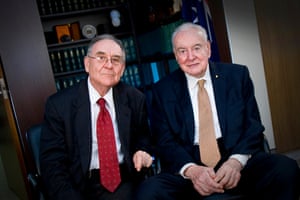
He was not just there at the absolute centre of power for more than 40 years; he was writing the script. There would 21 policy speeches. They were, says Freudenberg in the film, “A unique Australian institution, a mixture of high endeavour and pork barrelling.”
The former New South Wales premier and federal foreign affairs minister Bob Carr says what distinguished a Freudenberg speech was that “he elevates its sentiments, and the romance of its history, he has got a matchless sense of rhythm in his speechwriting, which is just unrivalled. The conclusions of his speeches can be galvanising.”
Freudenberg, known universally as “Freudy”, is stooped now, frail, not well. But at 84 the elegant intellect that underpinned the Labor movement is undiminished. Behind his spectacles the eyes still gleam with the impish, wicked humour for which he was known. The voice is gravelly from the cigarettes he continues to smoke, unrepentant. In retirement he returned to Brisbane where he grew up, and now lives in a comfortable suburban house across the bridge from Bribie Island. He is the keeper of memories, of a rambunctious history, the master of the art of persuasion.
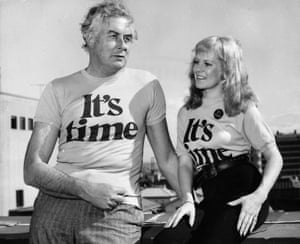
The coffee table is piled with history books, on his desk are neatly handwritten notes. He doesn’t own “those things you send messages on” – a cellphone – and has never used a computer. Famously nocturnal he would start working over dinner and dictate the speeches to a staff stenographer, with immensely long pauses while he found the right weight of a word to put in a politician’s mouth. This is how he got the rhythm of the way that person spoke. There would be a Latin quote for Gough, “which I would never do for Neville or Bob”. Whitlam staffer Carol Summerhayes once timed him at dictating three words a minute. But, she says, “it was always the right word and those words lasted”.
“And of course at a certain stage in most speeches I would need some liquid refreshment – it could go on until 3 or 4 in the morning. I used to measure my speeches by the number of cans consumed. A good speech might be a six-can job, a great speech might be a 15-can job,” Freudenberg says in The Scribe.
“The pace at which I drank didn’t make me drunk,” he qualifies. “And the next day you could always check it and anything that was a bit over top you could fix.”
Carr adds: “You never worried that he wasn’t answering his phone during daylight hours and he needed tobacco and cans of beer; it didn’t matter because of the depth of his history and the diamond-hard quality of his memory. He never missed a deadline. For the big speeches he served them up without any conference or discussion with me. In 1996 when I was premier he wrote a speech welcoming Bill Clinton to Sydney that just couldn’t be improved upon.”
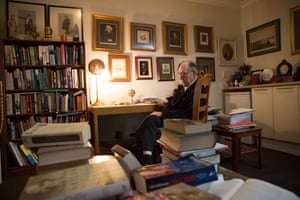
He was at a party when a friend told him that a job with then Labor leader Arthur Calwell was becoming vacant. “It was early before I was blotto or the whole course of my life would be completely different,” Freudenberg recalls.
Within three months it was the 1961 election and he was writing the daily speeches that were delivered at the Town Hall. Calwell was vehemently opposed to conscription and the Vietnam war at a time when it was popular in Australia. On the 4 May 1964, Calwell delivered a classic Freudenberg speech now known as “the Drum Beat speech”, written when he was 31.
"When the drums beat and the trumpets sound, the voice of reason can be heard in the land. Only with difficulty I offer you that sure and certain knowledge the generations to come will recall with gratitude that when a reckless government wilfully endangered the security of this country the voice of the Labor party was heard, strong and clear."
“A great speech,” muses Freudenberg, “requires a great issue and that is why my Vietnam speeches were undoubtedly the best I wrote because the issue was so important.”
Out of more than 1,000 speeches he wrote, he believes this one had the most profound impact, “because its great purpose was not to analyse the war in Vietnam, but to say that the Americans would be humiliated. To say that in 1965 was to invite ridicule but it was right.”
From the very beginning Freudenberg was seduced by the capriciousness of politics. “Anyone who thinks they have got the formula for how politics works doesn’t know politics. It is the unpredictability that makes it so exciting and glorious and sometimes awful. That is its fatal fascination,” he says in The Scribe.
"Gough’s last words to me before he was dismissed were ‘You don’t think we are being a bit tough on Malcolm do you?’"
And in spite of all the persuasive words expended to woo them, he still doesn’t know who the swinging voter is. “No one is quite sure. And for all the polling that goes on there has never been a really scientific attempt to identify what makes a person change his mind. The most active voter will never change.”
In this day and age a presidential campaign can be won with the brevity of Twitter. But politics has been built on the spoken word. “It is the essential equipment of any politician. I say all speeches are essentially an argument, they make a case,” he says.
Ruth Cullen, the director of The Scribe, and whose father Peter was a Whitlam staffer, says: “We ignore this at our peril.”
Donald Trump, Freudenberg says, is “authentic, but I see the deadly side. The authentic Trump is someone who despises democracy, despises his own cabinet, despises practically everything. And is serious about the things he despises.”
He is “fairly sure” that Scott Morrison will be “a flop. Because I think he does take people at the lowest common denominator.”
Freudenberg and Neville Wran used to have a standing joke about speeches. “That there were three types of speeches: one was Gettysburg, there was the inspirational ceremonial speech and one was Chatham. Chatham is a bit more obscure. In 1964 Harold Wilson was campaigning in the naval base, rabbiting on about the role the navy would still play in government. He said, ‘My friends, why am I saying this?’ And a dock worker piped up from the back, ‘Because you are in Chatham ‘Arold.’ The Chatham speech is purely political, directly fashioned to get votes.”
And there were plenty of Chathams. But, he says, more important is respect, for the person who is giving the speech and the audience who is receiving it. “It is impossible to spend a career trying to persuade people to give you the most valuable thing they have as far as you are concerned and not do it with respect,” he says.
Freudenberg says his happiest times were in the opposition years with Whitlam. “For purpose and meaning, I was never quite happy in parliament, I was a cog in a big wheel, I didn’t adjust too well, except in election time and a crisis.” He was also happiest during the Neville Wran years. “It was all about the fun of politics,” he says, though adds drily: “It wasn’t so much fun during the royal commission. Neville loved life, he loved Sydney, he loved strutting his stuff on the House of Representatives Legislative Assembly floor.” When Wran resigned in 1986, “We made it pure theatre, starting very low-key with the record of the government and then building up and building and suddenly this announcement that he was resigning to really emotional shouts and ‘no, no’, tears.”
Bob Hawke was the most likely to change a speech. “He liked to have more input, he put more into it. He would write on it in his own hand.” In April 1990 Hawke ended an emotional speech at Gallipoli in tears. For that one Freudenberg was thinking of his father. “He was at Gallipoli.”
He didn’t work much for Paul Keating “because of the circumstances of Hawke’s deposition in 1991 it was not proper, not appropriate”.
Freudenberg was rarely photographed with the leaders whose words he wrote. He was the quintessential backroom boy. “I never had the title of speechwriter, and I was never acknowledged,” he says. He had realised early that “I didn’t have all the qualities required to get preselection from a party, much less the Labor party.”
Instead he wrote the words that made history, that changed the country. He was there but not there. “I had the best of both worlds. You couldn’t be more in politics than I was without having to do the dirty work, the grubby business of electoral work.”
He was beside men as they took power and there when they lost it. “But power on the individual scale is a very mythical thing – a very intangible and slippery thing,” he says.
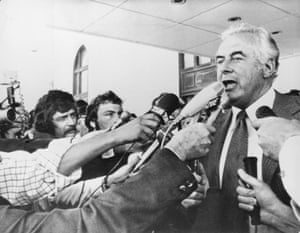
And he was there at the end for Gough, at The Lodge in 1975 on the day of the dismissal.
“Gough’s last words to me before he was dismissed were ‘You don’t think we are being a bit tough on Malcolm do you?’ Ten hours later he was bloody prime minister.”
On the day of the dismissal they had thought the tide of public opinion was turning and that four senators were going to vote to pass the budget. He thinks of this day now with “shame. I am not proud of myself, I just crumpled”. Whitlam had called his staff to the Lodge. “He was having a steak, that says something about Gough, his career was in total ruin, the work of all those years and he was getting stuck into a steak. He said ‘I have been sacked’ and gave me the letter for [the then governor-general, John] Kerr. It swam before my eyes. We all sat there like stunned mullets – except Gough who busily writing in longhand the motion of no confidence in Fraser or in any government formed by the member for Wannon. He kept his wits about him.”
Politics, he says, “is not a religion”, even though it has been his.
“When we get to the core of things, when we recognise that if parliamentary democracy is to survive we must attract and respect the men and women who attempt to keep the show running. And we have got to keep the show running.”
• The Scribe will be screening at the Antenna film festival on 10 October
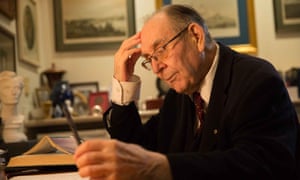
No comments:
Post a Comment